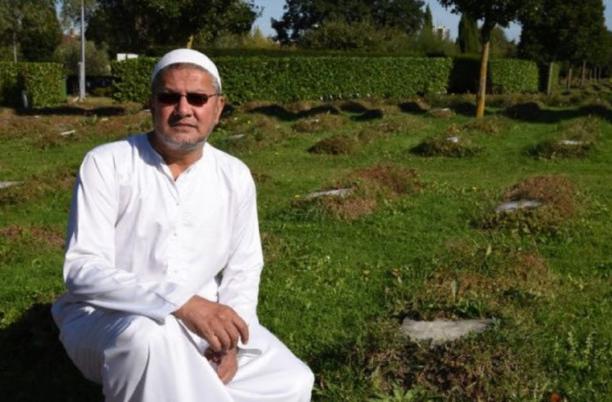

Gardens of Peace is a Muslim cemetery in Ilford, East London. In 2016 it was named Cemetery of the Year by the Good Funeral Guide. Here co-founder Mohamed Omer tells us about Muslim burials and how conversations about death and dying are broached in Muslim communities.
What led you to co-found Gardens of Peace?
My father always assisted families who had burial needs in Zambia, where I was born. However more pertinently, we are first generation in the UK, my children were born in this country and we are all British.
Whilst the Muslim community had made provisions for a mosque, school and community centres, there was no dedicated Muslim burial space in accordance with our religious requirements. Six individuals (including me) decided that this was something we needed for the community as we will not want to be repatriated, nor will our children permit that. In any case our teachings are that you should be buried where you die.
How do you make sure people leave the cemetery feeling calm and peaceful, given the circumstances under which they might be visiting?
Our ethos is very simple, if a bereaved person comes to the cemetery for a burial, we want them to leave with the comfort that their loved one is buried in a peaceful and tranquil place. We also do our utmost to show empathy and give words of comfort to the family members. Our surroundings have been deliberately landscaped in a beautiful manner to provide this serenity and peacefulness. Besides we believe that all living beings have been created to worship the almighty, including plants and trees.
What is the role of the cemetery in the local community?
We provide training sessions on what to do when someone dies, both from a legal and a religious perspective. We encourage school visits so that children can learn about death in a gentle and tranquil surrounding. We provide visits for different faith groups so they can understand and learn about our burial requirements.
There is a provision for people to come and contemplate, and not only visit their loved ones but reflect and pray. There is a clothes bank where people from our community can donate their clothes, shoes and bags to a recognised charity that will distribute the proceeds for worthy causes. We believe that once a person dies, any charitable act on their behalf will be directly rewarded to them and be counted as a good deed on their behalf. We also provide a service to dispose of religious papers that have been damaged in an appropriate and Islamic manner.
What does the Muslim Bereavement Support Service offer?
We started it specifically for women, as we felt that there was a gap in support for them . We recognise that although our religion teaches us that we should accept the will of Allah and exercise patience, we are human beings and as such we are bound to feel pain. That leaves a person either sharing their grief with their families, with a secular organisation, or with a doctor.
There are challenges with all three, and therefore we felt that we could offer a befriending service specifically for women by women who have been trained both in a secular as well as Islamic manner. We offer face-to-face and telephone sessions, free of charge.
How are conversations about death and dying approached in the Muslim community?
We are told about death from a very young age, and therefore the concept of death is talked about very widely within our community. We are told that we were sent to this temporary world to prepare for a life of eternity, and therefore death is the start of that journey which will last forever.
Our teachings are that in this world you do good deeds, stay away from evil, and prepare yourself for the everlasting life. Death is inevitable but what is not certain is the time of death. We are encouraged to visit the cemetery as often as possible so that we are reminded of death, and also it will soften our hearts.
What are the main differences between Muslim and Christian burials?
We believe in shroud burials, that the grave should face Mecca, and there should be a raised mound on the grave so no one steps on it. Identical graves depict that in Islam all individuals are the same, irrespective of their colour, sex, ethnicity, status or wealth. The only thing that distinguishes them are their deeds.
We also believe in speedy burials, within 24 hours. The reason for the speedy burial is so that the deceased can seek the reward of all the good deeds they did in this world. In terms of the actual burial the process is the same in terms of lowering the body into the grave, however family members are allowed to lower the body themselves.
Although the person buried is in a shroud, we place a plank over the body so that earth does not touch it. All the backfill must be done before prayers are said, as opposed to Christian funerals where only a token amount is placed in the grave and it is filled later on. It is seen as a great blessing to participate in the burial process.
